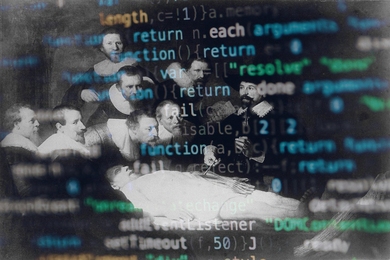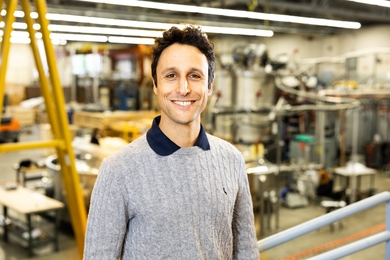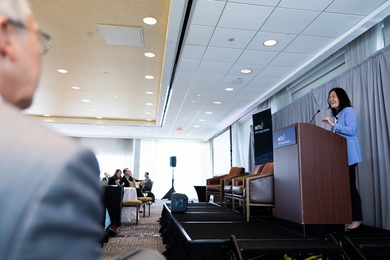Susanne Elizabeth Martin, who worked at MIT for 29 years, passed away peacefully at her home in Reading, Massachusetts, on August 14. She was 68.
She was born to Jack Martin and Rose Ellen Plutchak Martin (formerly of Rockland, Michigan) on December 3, 1946. Her family moved to Detroit in 1960, where she graduated from Redford High School. She attended St. John’s College in Annapolis and completed her BA through the Harvard University Extension School.
Martin’s career at MIT began at MIT Medical, where she started in 1978 as a senior office assistant. In 1993, she became the administrative officer for the Writing Program (then called the Writing and Humanistic Studies Program) in the School of Humanities, Arts, and Social Sciences, where she worked until her retirement in 2007.
Like many MIT administrators of her era, Susanne played a crucial role in bringing about the office revolution in computing and communication at the Institute through implementing successive advances in communication, spreadsheets, and database management. She was an innovator who enjoyed the challenge of managing complex environments, rising to supervisor of the business office in MIT Medical from 1986 to 1993. In the early 1980s, Martin helped develop a new pharmacy cash control system and, during her years as supervisor, worked with consultants and database managers to develop a new in-house computerized billing system.
As a lover of great books, an exceptionally widely read intellectual, and a discerning art appreciator, Martin savored her role as the administrative officer of the Writing Program. With her impressive range, spanning the computational complexities of administrative management and the contemporary world of the arts and humanities, she formed close friendships with many program members, who often called her the soul of the program. Martin was especially close to many of the artists in the program, including Ilona Karmel, Anita Desai, Joe and Gay Haldeman, Helen Lee, Rob Kanigel, and Ellen Cooney.
Martin was also a resourceful planner and builder, managing details with ease. She oversaw the program's involvement in two major educational initiatives: a graduate program in science writing and the Institute-wide Undergraduate Communication Requirement. Extensive new interdepartmental coordinating and personnel structures were required for a growing pool of collaborating faculty, lecturers, and support staff who gave these programs their energy and effect.
Martin not only oversaw the implementation of these programs, but she gained a reputation as a fixer with heart. “People over systems” was the rule of her administration. Sarah Merrow, a former graduate administrator of the Program in Science Writing, recalls, “Susanne cared deeply about the people around her, and strove to enhance the working environment in the various programs she managed. She kept a discerning eye on the well being of the staff for whom she was responsible. As a manager, she encouraged us to explore and accomplish, and knew when to step in and when to step back."
As Martin rose through the administration, she became known as a talented counselor. Rob Kanigel, a former head of Writing and Humanistic Studies observed: "I’d drop by her office, sit down with her, and learn. I’d learn about the culture of MIT. I’d ask, she’d listen — her deep, still, wise eyes taking it all in, focused on the question, the problem, the conundrum. Then she’d speak. She was not shy about saying what she thought. She was forthright. But what she advised always responded to the full context of the situation, with all its ins and outs and trap doors. Her wise listening came first."
Ellen Cooney, a former writer-in-residence, recalls: "To walk into her office, whether for the first time or the hundredth, meant that you'd be met by a gracious, keenly smart, gentle-mannered professional who made you know in one second that your problem, large or small, was already on the way to being solved. There was a calm dignity about her all the time, even when she was laughing her head off at a situation that might have felt awful, had she not reached into her skill set for her gifts of humor, caring, and a lovely ability to blend her professionalism with plain old human warmth and genuine feeling. She could administrate effortlessly, even casually — or so she would make it seem."
Helen Lee, professor of fiction writing, remembers: "During the days when Susanne was with the Writing Program, there was such a feeling of common purpose and warmth in the program. She never failed to ask about my family or my writing, or to share gardening tips or insights about everyday experience. She operated in the spirit of, 'How can I help you to be your best?' She related to the members of the program as people, and we took genuine interest in each other's lives. She has been greatly missed since retirement and the loss is now immeasurable."
After Martin retired she stayed in touch with many Writing Program colleagues, inviting small groups to teas in her historic Reading cottage, which she lovingly tended, along with her expansive perennial garden and her cat, Guy Noir. She volunteered regularly at Mission of Deeds, a Reading nonprofit that provides beds and furniture for those in need.
A memorial service for Susanne will be held August 22 at the First Congregational Church in Winchester, Massachusetts. She is survived by her father, Jack Martin; her siblings, Kathleen Martin, Peggy Kreger (Brian), John Martin (Jenny), Fred Martin (Linda), and Mary Martin; and her nieces Andrew, Jack, Jessica, Becky, Lizzie, and Thomas. Anyone wishing to make a memorial donation in Susanne’s memory can do so at Mission of Deeds.
_______________________________________________________________________________
Prepared by James Paradis, the Robert M. Metcalfe Professor of Writing and Comparative Media Studies, with assistance from Karen Boiko, lecturer in CMS/W, and from MIT SHASS Communications





